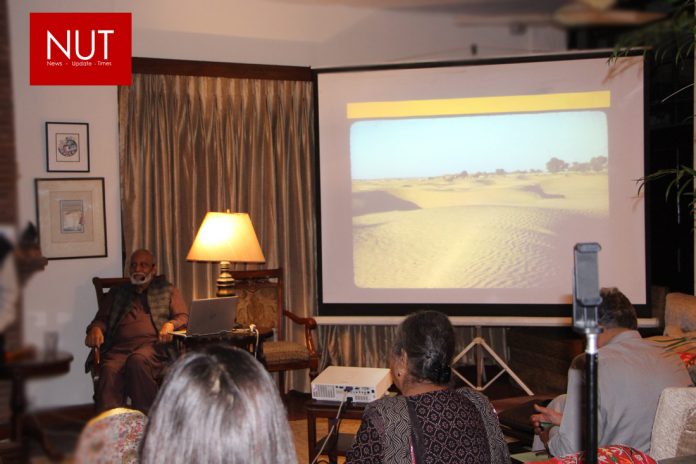Lahore (Qasim Ali)
In an effort to spread awareness about one of the oldest and ancient Hakra culture, Thaap hosted an enlightening information session (54th Thaap Talk), in which eminent archaeologist Professor Dr. Mohammad Rafique Mughal presented insightful details of Hakra culture and its connection with the Harappan or Indus Civilization. The talk was attended by a large number of archaeology students, researchers, historians, and academicians.
Dr. Rafique Mughal presented a comprehensive introduction to the Hakra cultural phase and its characteristics. He said that initial footprints of Hakra marking the first stage of the Indus civilization were discovered at Jalilpur, Multan district in 1971. Further survey and research revealed more sites details of Hakra cultural phase which were found to be wide spread before the emergence of Harappa and Mohenjo-daro.
Situated all the banks of (now dry) Hakra River and beyond in the Indian territory of north Rajasthan and east Punjab, the Hakra settlements show a distinct tradition and life from the nomadic to permanent settlements. Its cultural components gradually merged with the well known Kot Dijian culture now recognised as Early Harappan culture of the Greater Indus valley. The great cities of the Harappan /Indus Civilization represent its climax.
Archaeologists on both sides of international borders have revealed that Hakra culture had strong footprints in Cholistan and surrounding areas. Its settlements have been found at Sheri Khan Tarakai in KPK, northern Punjab, Harappa in Pakistan and across the border at Girawad and Farmana in India. With the passage of time, Hakra culture evolved to its mature or fully organised stage. It had even developed trade links with other regions as well. Production, selling, and exchange of various items were routine features. Dr. Rafique also explained notable characteristics of Hakra cultural phase, life patterns of its inhabitants, folk culture, birds, animals, ceramics, and artefacts.
During the talk, Dr. Mughal mentioned that the journal, Pakistan Archaeology, volume 29 contains a great deal of information on the monuments and ancient sites including Hakra sites which was documented during another survey of the Punjab conducted by the Pakistani archaeologists. He urged that educational institutions should expose young archaeology students to field work like those of Hazara University so that more information on Hakra and early civilization could be documented.
He also answered various questions asked by the scholars and students regarding evolution of Hakra culture. Dr. Rafique Mughal invited students to join Madam Sajida Haider Vandal for few weeks in Cholistan to do field research work. He suggested that universities should devise specific training courses for the students of archaeology and priority should be given to the field work beside theoretical study.
Professor Pervaiz Vandal thanked the Dr. Rafique Mughal at the end of indepth and scholarly talk. He gave reference to a folk song of Cholistan ” Mola wal wasa day Hakra” (O God make Hakra inhabitable again). He said that there is a dire need to further research and more excavation to gain a full picture of Hakra cultural phase of the Harappan Civilization and to present it the world.






